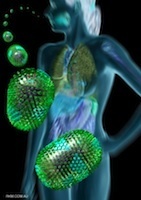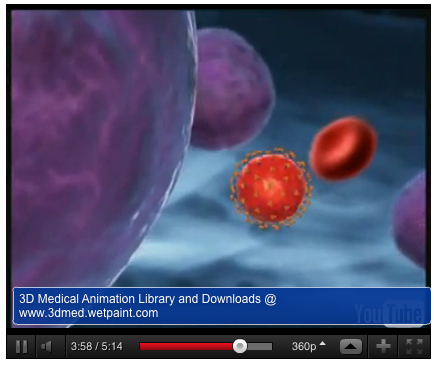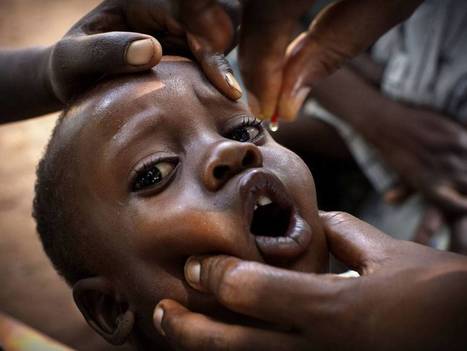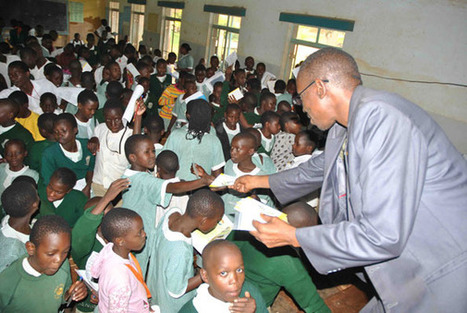 Your new post is loading...
 Your new post is loading...

|
Scooped by
Ed Rybicki
March 28, 2012 3:00 PM
|
Early temporary treatment for HIV can delay the time to long-term treatmentEurekAlert (press release)A study in this week's PLoS Medicine suggests that when people are first infected with HIV (primary HIV infection), temporary treatment with antiretroviral...

|
Scooped by
Ed Rybicki
March 28, 2012 2:57 PM
|
TUESDAY, March 27 (HealthDay News) -- A new study finds that women diagnosed with pre-cancerous cervical conditions after they get the human papillomavirus (HPV) vaccine can still benefit from the shot because it cuts their risk of futureHPV-related cervical disease."This study helps to clarify the effects of the HPV vaccine and further define its use," noted one expert, Dr. Elizabeth Poynor, a gynecologic oncologist and pelvic surgeon at Lenox Hill Hospital in New York City.

|
Scooped by
Ed Rybicki
March 27, 2012 1:49 PM
|
ROCKVILLE, Md. -- Novavax, Inc. today announced that it has begun enrollment in a Phase II clinical trial of its quadrivalent seasonal influenza virus-like particle (VLP) vaccine candidate. This randomized, ...

|
Scooped by
Ed Rybicki
March 27, 2012 1:47 PM
|
Just because legislating immunization coverage works in the United States doesn't mean it will work in Pakistan. The main reason is that the drivers of under-vaccination in Pakistan and the United States are fundamentally different.

|
Scooped by
Ed Rybicki
March 27, 2012 1:39 PM
|
FluMist Quadrivalent, a vaccine to prevent seasonal influenza in people ages 2 years through 49 years, has been approved today by the U.S. Food and Drug Administration.

|
Scooped by
Ed Rybicki
March 26, 2012 7:48 AM
|
A genetic finding could help explain why influenza becomes a life-threatening disease to some people while it has only mild effects in others. New research led by the Wellcome Trust Sanger Institute has identified for the first time a human gene that influences how we respond to influenza infection. People who carry a particular variant of a gene called IFITM3 are significantly more likely to be hospitalised when they fall ill with influenza than those who carry other variants, the team found. This gene plays a critical role in protecting the body against infection with influenza and a rare version of it appears to make people more susceptible to severe forms of the disease. The results are published in the journal Nature. Graphic courtesy Russell Kightley Media

|
Scooped by
Ed Rybicki
March 26, 2012 7:39 AM
|
Really?? HIV-infected Ukrainian hookers are the ONLY reason to avoid sex workers while on a football-watching excursion??

|
Scooped by
Ed Rybicki
March 26, 2012 7:36 AM
|
The dreaded swine flu is back in the twin cities but guess what is keeping it on the leash? The rising temperature is more than compensating for the absence of precautionary measures so much so that doctors at the Government General and Chest Diseases Hospital at Erragadda are confident that the H1N1 virus will soon wither away. Finally - a use for heat in India!

|
Scooped by
Ed Rybicki
March 25, 2012 9:55 AM
|
Two antigenically distinct lineages of influenza B viruses have circulated globally since 1985. However, licensed trivalent seasonal influenza vaccines contain antigens from only a single influenza B virus and thus provide limited immunity against circulating influenza B strains of the lineage not present in the vaccine. In recent years, predictions about which B lineage will predominate in an upcoming influenza season have been no better than chance alone, correct in only 5 of the 10 seasons from 2001 to 2011. Consequently, seasonal influenza vaccines could be improved by inclusion of influenza B strains of both lineages. The resulting quadrivalent influenza vaccines would allow influenza vaccination campaigns to respond more effectively to current global influenza epidemiology. Influenza vaccine graphic courtesy Russell Kightley Media

|
Scooped by
Ed Rybicki
March 25, 2012 6:34 AM
|
An interesting, but not completely accurate animated account of HIV-1 particle entry and genome replication. Spot the mistakes for a chance to contribute to Virology News...B-)

|
Scooped by
Ed Rybicki
March 25, 2012 6:24 AM
|
Immunisation is one of the most cost-effective health investments. It has eradicated smallpox, reduced the global incidence of polio by 99 per cent, and decreased many other causes of illness and death. More children than ever before are being reached with immunisation. In 2009, an estimated 107 million children under the age of one were vaccinated with three doses of diphtheria-tetanus-pertussis (DTP3) vaccine. And in the developed world, people are turning away from vaccines. Idiots...it has already happened that travellers TO developed countries have brought vaccine-preventable diseases back to developing countries where they had been eradicated.

|
Scooped by
Ed Rybicki
March 24, 2012 10:43 AM
|
Molecular farming is an experimental application of biotechnology to modify crops in order to produce proteins and chemicals for medicinal and commercial interests. The vast majority in the developing world cannot afford the high cost of therapeutics produced by existing methods. We not only need to produce new therapeutics but also need to produce cheaper versions of the existing ones. Molecular farming could offer a viable option for this growing need for biopharmaceuticals. Part of the thesis deals with investigating ways to produce DesB30 form of human insulin in transgenic tobacco. The human insulin was synthesized in vitro as strep-tag II-mini-insulin fusion protein. Way to go, UoL! Thanks, AJCann. Going green: the right thing to do.

|
Scooped by
Ed Rybicki
March 24, 2012 10:34 AM
|
The government plans to bring down new HIV infection rates to zero in the next 20 years, Deputy President Kgalema Motlanthe [of South Africa] said on Saturday. That would be quite something: because right now they're still sky high, even though they're decreasing.
|

|
Scooped by
Ed Rybicki
March 28, 2012 2:59 PM
|
He developed a vaccine used worldwide to prevent cervical cancer. Now the Australian scientist behind that pivotal technology is developing a second vaccine to tackle the human papillomavirus (HPV) which, if successful, could further reduce rates of the aggressive cancer. Professor Ian Frazer, who was named Australian of the Year in 2006 for developing the groundbreaking vaccine, is working with Brisbane-based biotechnology company Coridon on the new inoculation. The Gardasil and Cervarix vaccines, which are currently available free for 12 and 13-year-old girls, prevent infection with the cancer-causing HPV virus. The new vaccine will treat people already infected with the virus, to stop the infection leading to cancer, Prof Frazer said.

|
Scooped by
Ed Rybicki
March 28, 2012 2:54 PM
|
The first experiments with plants genetically-modified to repel aphids are under way in the UK. Wheat has been engineered with a gene from a peppermint plant so that it emits a particular pheromone. The smell is the alarm signal given off by aphids to warn of an attack by predators. The researchers hope that this will act as a "no parking sign" to keep the pests at bay without needing insecticide. This is the first trial of a plant deliberately modified to use pheromones to ward off pests. The work is taking place at Rothamsted Research, the plant science centre in Hertfordshire Nice place, Rothamsted: and aphids transmit viruses, so it's right for this site. Sort of.

|
Scooped by
Ed Rybicki
March 27, 2012 1:48 PM
|
On March 26, 1953, American medical researcher Dr. Jonas Salk announces on a national radio show that he has successfully tested a vaccine against poliomyelitis, the virus that causes the crippling disease of polio.

|
Scooped by
Ed Rybicki
March 27, 2012 1:46 PM
|
"Fouchier told the audience that virulence is a tough issue to describe and needs to be clearly defined. He said the virus was virulent in ferrets that were inoculated deep within their lungs, and it was virulent in those who were sickened via the aerosol route, though they didn't die. "There's a lot of quotes in the press that are simply wrong," he said, adding that the definition of virulence touches on other factors such as dose, immune status of the host, and previous exposure to other types of flu. Fouchier said full publication of both studies would help clarify questions scientists and observers have about virulence of the lab-modified viruses. During today's webcast, Racaniello asked for more details about the study, but Fouchier said the NSABB asked him not to disclose details about the methods or mutations. However, he said his group found a number of mutations in common when they sequenced the viruses that had made the jump to airborne spread. "Most of those were pretty interesting," he said, adding that some of the mutations are the same ones Kawaoka's group found, though that group took a different approach to the study. "That was a shock to me and to Yoshi," he said." Meaning that we should be out there LOOKing for them...thanks, Vincent! Image courtesy Russell Kightley Media

|
Scooped by
Ed Rybicki
March 27, 2012 1:37 PM
|
We thus demonstrate for the first time that cattle can be clinically protected against FMDV challenge following a DNA prime-protein boost strategy, and particularly when DNA vaccine is combined with GM-CSF and delivered by electroporation. Thanks MicrobeTweets!

|
Scooped by
Ed Rybicki
March 26, 2012 7:46 AM
|
Primary going children from schools [in Uganda] where the new HIV syllabus is being piloted are embracing it with excitement, saying it would redeem the future generation of the deadly HIV/Aids. Good news from Africa!

|
Scooped by
Ed Rybicki
March 26, 2012 7:38 AM
|
Two of the most unhealthy places to work are hospitals and schools. Hospitals obviously are frequented by sick people, and children often carry and spread illnesses to each other and their families. To clamp down on infectious disease, hospitals in the area are requiring their employees to get flu shots. Charleston Area Medical Center began requiring the 6,000 employees at its various hospitals to get flu shots in August 2009, ahead of fears of a swine flu epidemic. Last year, fewer than 30 employees received waivers for various reasons, and the hospital system fired two people who refused to be vaccinated. The utmost concern was for the protection of other employees and patients. It is a matter for amazement to me that HEALTH CARE WORKERS refuse to get vaccinated against flu!

|
Scooped by
Ed Rybicki
March 25, 2012 9:58 AM
|
Here, we examined the effects of H5N1 on several pathological aspects affected in parkinsonism, including loss of the phenotype of dopaminergic neurons located in the substantia nigra pars compacta (SNpc), expression of monoamines and indolamines in brain, alterations in SNpc microglia number and morphology, and expression of cytokines, chemokines, and growth factors. We find that H5N1 induces a transient loss of the dopaminergic phenotype in SNpc and now report that this loss recovers by 90 d after infection. A similar pattern of loss and recovery was seen in monoamine levels of the basal ganglia....We conclude that H5N1 infection in mice induces a long-lasting inflammatory response in brain and may play a contributing factor in the development of pathologies in neurodegenerative disorders.

|
Scooped by
Ed Rybicki
March 25, 2012 9:52 AM
|
Rotavirus is a major cause of diarrhea-related morbidity and mortality in children worldwide. The virus is transmitted through feco-oral route. Its incubation period is about two days. Rotavirus graphic courtesy Russell Kightley Media

|
Scooped by
Ed Rybicki
March 25, 2012 6:26 AM
|
They belong to a club that no one else will ever join. Its numbers are dropping and notoriety is fading, and they risk becoming little more than a footnote in the history of the AIDS crisis.

|
Scooped by
Ed Rybicki
March 25, 2012 6:21 AM
|
Dr. Victor J. Cabasso, a pioneer virologist and immunologist who worked on creating the polio vaccine and other vaccines against human and animal virus diseases, died Feb. 28 at Kaiser Permanente Medical Center in Walnut Creek. He was 96. In his earliest days in America he became noted for his experiments in developing the altered live polio viruses that led to the live virus vaccine now widely used around the world. Read more: http://www.sfgate.com/cgi-bin/article.cgi?f=/c/a/2012/03/22/BA8V1NIJKT.DTL#ixzz1q7fRoUqy Poliovirus image courtesy of Russell Kightely Media

|
Scooped by
Ed Rybicki
March 25, 2012 6:18 AM
|
The rapid transmission of the pandemic 2009 H1N1 influenza virus (pH1N1) among humans has raised the concern of a potential emergence of reassortment between pH1N1 and highly pathogenic influenza strains, especially the avian H5N1 influenza. Here, we report that the cold-adapted pH1N1 live attenuated vaccine (CApH1N1) elicits cross-reactive immunity against seasonal and H5 influenza A viruses in the mouse model. Immunization with CApH1N1 induced both systemic and mucosal antibodies with broad reactivity to seasonal and H5 strains including HAPI H5N1 and the avian H5N2 virus, providing a complete protection against heterologous and hetero-subtypic lethal challenges. Our results not only accentuate the merit of using live attenuated influenza vaccines in view of cross-reactivity, but also represent the potential of CApH1N1 live vaccine for mitigating the clinical severity that arises from reassortant viruses between pH1N1 and highly pathogenic H5 subtype viruses. Interesting...maybe because the live attenuated vaccine elicits both humoral and cell-medidated immunity, and to more than just envelope glycoproteins?
|
 Your new post is loading...
Your new post is loading...
 Your new post is loading...
Your new post is loading...



























